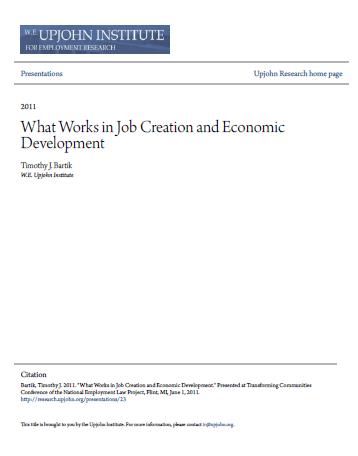Too many economic development policymakers are overly focused on the goal of economic growth. But growth is only good to the extent that it brings about increased real incomes for state and local residents. Benefit cost studies show that over 70% of the benefits of job growth are the resulting increase in per capita earnings. Focusing on growth in earnings per capita for all local residents, rather than growth in jobs or output, is crucial in changing the debate about economic development policy.
Changing the goal from job growth to earnings per capita growth changes which policies are most cost-effective. For example, if we are interested in growth in earnings per capita that is broadly shared, then who gets the new jobs becomes important. What policies best improve local job quality also becomes important. Once the goal is identified as a broad increase in local earnings per capita, it becomes clear that local economic development policy is really just local labor market policy. Earnings per capita is a labor market outcome. Better labor market outcomes can be achieved by either working on the “labor demand” side of the local labor market, or the “labor supply” side of the local labor market. We can directly increase the quantity and quality of jobs for local residents by directly interacting with local employers. Or, we can indirectly increase the quantity and quality of jobs for local residents by increasing the quantity and quality of local labor supply.
The key question for sound local economic development policy is the following: Which local labor demand and local labor supply policies have the best evidence of being the most cost-effective in increasing local earnings per capita across the local population?
Turning first to the labor demand side, the general business tax cuts being pushed by some Governors, including Governor Snyder here in Michigan, are unlikely to be cost-effective for several reasons. First, even if these general business tax cuts had no budget cost, for example if Bill Gates decided to finance a general business tax cut in your state, these general business tax cuts are too broad to be cost-effective. General business tax cuts include not only export-base businesses but also locally-oriented businesses. And tax cuts for locally-oriented businesses don’t do much for local economic development.





